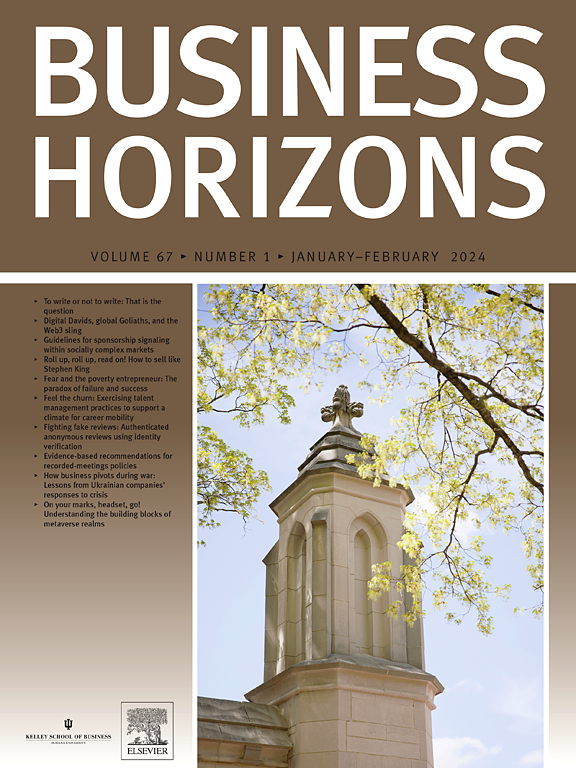"Todos pagan"(人人有份):哥伦比亚麦德林的中小企业与城市暴力
IF 7
3区 管理学
Q1 BUSINESS
引用次数: 0
摘要
麦德林是一座拥有 250 万人口的繁华都市,其特点是正规和非正规经济活动之间、合法和犯罪活动之间关系融洽。本文探讨了这种环境对中小型企业(SMEs)的意义以及中小型企业如何应对这种环境。在麦德林和其他地方,中小型企业的数量多于大型企业,但经营规模较小。它们在组织上更不正规,流动性更小(即更依赖于特定环境),对客户和法律当局更负责,在公共辩论中也不那么突出。与规模较大的公司相比,它们可能更需要采取集体行动来打击暴力,但它们也可能发现组织集体行动更具挑战性。因此,在暴力问题上,它们面临着与大公司不同的可能性。文章认为,麦德林的大多数中小型企业已经适应或驾驭了合法与非法、正规与非正规、实际暴力与威胁暴力的多重交织。只有极少数企业刻意改变外部环境。根据对官方文件、学术文献的审查,以及我们自己在数次实地考察和 39 次访谈中的观察,我们提出了中小企业对暴力参与者的反应的三部分类型:默许、回避和缓解。我们的研究结果对有兴趣了解有组织犯罪活动下的商业环境以及中小型企业如何调整自身做法以适应这些环境的管理者具有重要意义。研究结果表明,在支持中小企业在暴力环境中生存和发展方面,一些中小企业策略比其他策略更有效。但是,虽然为保护经济活动而与非法参与者合作可能有利于维持和平,并在短期内确保企业的生存能力,但从长远来看,这也对更有利于社区的成果构成了挑战:赋权、机构强化和包容性经济发展。本文章由计算机程序翻译,如有差异,请以英文原文为准。
“Todos pagan” (Everybody pays): SMEs and urban violence in Medellín, Colombia
Medellín, a bustling city of 2.5 million, is marked by convivial relations between formal and informal economic activity, and between legal and criminal actors. This article examines what this context means for small- and medium-sized enterprises (SMEs) and how they respond to it. In Medellín and elsewhere, SMEs are more numerous than large firms but operate at a smaller scale. They are organizationally more informal, less mobile (i.e., more dependent on specific contexts), more accountable to customers and legal authorities, and less prominent in public debate. Their need to act collectively to counter violence may be greater than that of larger companies, yet they may also find it more challenging to organize collective action. As a result, they face possibilities that are different from those of large companies in the context of violence. The article suggests that most SMEs in Medellín have adapted to, or navigate, the multiple, intersecting layers of legality and illegality, of formality and informality, and of actual or threatened violence. Only very few respond by deliberately seeking to change the external environment. Based on a review of official documents, academic literature, and our own observations during several field trips and 39 interviews, we develop a three-part typology of SME responses to violent actors: acquiescence, avoidance, and mitigation. The implications of our findings will be relevant to managers interested in understanding business conditions in the presence of organized criminal activity and the ways in which SMEs have adapted their own practices to those conditions. The findings suggest that some SME strategies are more effective than others in supporting the survival and growth of SMEs in violent contexts. But while cooperation with illegal actors for the purpose of safeguarding economic activities may be conducive to keeping the peace and ensuring enterprise viability in the short run, it also poses challenges to outcomes that would be more beneficial to communities in the long run: empowerment, institutional strengthening, and inclusive economic development.
求助全文
通过发布文献求助,成功后即可免费获取论文全文。
去求助
来源期刊

Business Horizons
BUSINESS-
CiteScore
17.70
自引率
5.40%
发文量
105
期刊介绍:
Business Horizons, the bimonthly journal of the Kelley School of Business at Indiana University, is dedicated to publishing original articles that appeal to both business academics and practitioners. Our editorial focus is on covering a diverse array of topics within the broader field of business, with a particular emphasis on identifying critical business issues and proposing practical solutions. Our goal is to inspire readers to approach business practices from new and innovative perspectives. Business Horizons occupies a distinctive position among business publications by offering articles that strike a balance between academic rigor and practical relevance. As such, our articles are grounded in scholarly research yet presented in a clear and accessible format, making them relevant to a broad audience within the business community.
 求助内容:
求助内容: 应助结果提醒方式:
应助结果提醒方式:


